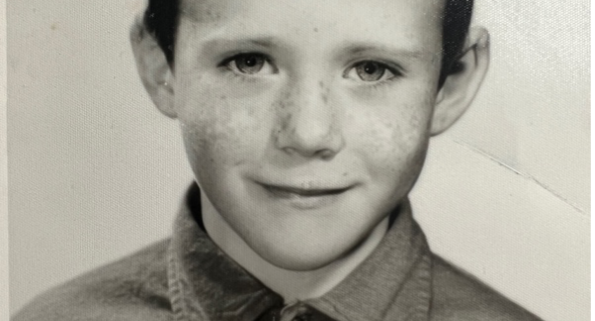Are You Addicted to Food? | Healthy Aging Series: Strategies for Breaking Up, Part 3 | S9 E12
Are You Addicted to Food?
I was a precocious five-year-old. Very curious. Very talkative like my mother. And like most children my age, innocent. My parents said that I was the easiest of nine to raise. Maybe I misheard them, but that’s what I want to believe.
And so, I’m guessing that it would surprise you if I told you that my kindergarten teacher paddled me in class, in front of all my classmates. Her name was Mrs. Pott, Mrs. Dessa Pott.
It was circle time. Mrs. Pott gave us some instructions. “I’m going to show you a picture and then go around the circle and ask each of you a question about what you saw in the picture. Don’t repeat someone else’s answer.”
Of course, I was so bored and wanted out of the prison called Stringtown Elementary, so I tuned her out. I didn’t hear the instructions, blah, blah, blah.
She came to me, and she said, “Next, it’s the little freckle faced boy’s turn.”
And as sure as I am typing this, I repeated verbatim what little Pammy had just said.
“Oh,” Mrs. Pott said glaring at me. “Little freckle faced boy, I want you to stand up and walk to my desk, go ahead now.“
I stood up, and the little freckles on my face were looking like little croutons in a bowl of tomato soup, and I did the dead man walking thing.
“Now, reach in and grab the paddle and bring it here.”
That walk was like the walk in the 1957 anti-war movie I saw this past year staring Kirk Douglas, “Paths of Glory.” Douglas was a French colonel who is unable to save three of his innocent soldiers from execution. It was gut wrenching as they marched these three soldiers to the firing squad through columns of their own troops. They were being made an example. Completely innocent. Probably heroes. I’m sure it felt incredulous that they were being executed because several other soldiers failed to charge when given the orders to attack.
That’s how I felt, reaching into that drawer, picking up the paddle, walking through the circle formation of my kindergarten classmates, and delivering it to Mrs. Despot, I mean Mrs. Dessa Pott. I’m sure I looked at her with incredulity.
She had me bend over, without a trial, without even a good explanation, and gave me two or three, or maybe five swats.
Complexes
I’m sure somewhere in my young psyche, and what would become my shadow, I began developing a complex, about school and education, that would affect my self-confidence and my desire to learn for many years.
Thankfully, my fifth-grade teacher at Elberfeld Elementary would help me make a course correction and would reignite my curiosity and love for learning. “Little freckle face boy,“ she said, “you are very smart, and you could accomplish anything if you just tried.“ And then, that became part of my educational complex. It helped me think differently about education.
Complexes are a collection of experiences, ideas, beliefs, and values that you have that revolve around a theme, like money, work, family, friendships, education, your parents, just to name a few. Complexes can exert a strong, unconscious influence over you. In fact, you can be possessed by a complex and not even be aware of its influence and control over you.
Breaking Up with Food
We have been exploring ways to break up with food. Why? Because many of us have a dysfunctional relationship with food. All of us have a food complex. Think about the millions and millions and millions of millions experiences you’ve had with food. Maybe not that many, but a lot. I’m 67. Times 360 days. Times three meals a day. Equals 73,365 experiences. Every time you see a commercial with food. Every time you walk into a store or anywhere with food.
These experiences make up your food complex. All of our experiences, and conversations about food, anything your parents said, your teachers taught, your friends modeled, diet books explained, and everything you can imagine about food makes up your food complex, and it controls you every day.
That’s why it doesn’t matter what diet you try, and it doesn’t matter how much weight you lose, if you don’t work on your food complex, you’ll regain all of the weight loss, because breaking up with food is mostly an inside job.
“Hungry: Lessons Learned on the Journey from Fat to Fit.” Allan Zadoff
That’s one of the lessons that Alan Zadoff shares in his book, “Hungry: Lessons Learned on the Journey from Fat to Fit.”
Zadoff explains that 90% of our fight with breaking up with food is an inside job with only 10% involving what’s outside of us.
This is the fifth or sixth obesity memoir I’ve reflected on this season. He hits the nail on the head throughout his book on breaking up with food. There are so many good things to share that I’m going to make this into two separate episodes.
This episode, 11, will share about Zadoff’s discovery of his addiction to food, the disease of compulsive overeating
The next episode, 12, will share some very specific strategies that he used to overcome his addiction to what he calls trigger foods
My takeaways from “Hungry.”
The First Take-Away from “Hungry”
Zadoff gives us insight into compulsive overeating as a disease. I have listened to talk-show hosts who don’t have an overeating problem and don’t suffer from obesity, and who often suggest that people who suffer as compulsive overeaters and suffer from obesity simply need to learn how to push back their plates.
I don’t think these folk mean to be malicious or judgmental, they simply don’t understand the all-encompassing aspects of this problem. Zadoff would say, “Yes, they need to be able to push back their plates but,” he would add, “feeling satiated has little to do with a food addiction.”
The disease of compulsive overeating is an addiction that affects many people mentally and physically. Zadoff would also add spiritually to that list. Compulsive overeaters are not addicted to all food but to “trigger foods.”
These are the foods that control the addict in much the same way that alcohol or nicotine controls people with those addictions. Sure, there are people who can eat almost anything without being a compulsive overeater, but compulsive overeaters, enter a land where choice is extinct. Dopamine plays a role in this addiction. Emotions, including shame, guilt, happiness, and joy also play a role. Our appetites and cravings play a role. Our evolutionary biology, which causes us to seek out calorie dense foods and salty foods, plays a role.
The point I think Zadoff is making isn’t that if you’re a compulsive overeater, there is nothing you can do about it. You’re doomed! On the contrary, he is saying you can overcome your overeating. But you cannot overcome it with purely behavioral and environmental changes, or solely with self-binding strategies. You can read about these in later blogs.
Throughout much of Zadoff’s life, he focused on trying to change his outside while his problem was inside. It had always been in his head, an inside job. In Alcoholics Anonymous, they say they don’t have a drinking problem, they had a thinking problem, stinking thinking.
Behavioral strategies are tools for change. Weight loss occurs by working on both the inside and the outside. Zadoff began putting 10% of his energy into eating and 90% into healing his life. Part of the inside job was learning to think differently about food.
“I knew that a hit of sugar on my tongue would make my frustrations disappear. It wasn’t a conscious thought; I knew it in my bones. Eating chocolate meant I wouldn’t have to think about the job I resented, the career dream I was ignoring, or the eating problem that was killing me. Enough chocolate, and I wouldn’t even remember that I was fat. I would be free.” He saw his food as medicine that would fix his problems.
How did Zadoff’s thinking change? He began seeing food as fuel. Eating to Live rather than living to eat.
Take-Away Two from “Hungry”
The next take away from Zadoff’s book has to do with thinking differently about your relationship with food. He enlightens us about three different types of eaters.
The first type of eater is a normal eater. They eat when they’re hungry and they stop when they’re full. Normal eaters can consume a little more over the holidays, but they lose weight they gain magically. Normal eaters are not obsessed with the next meal. Normal eaters are mostly OK with their bodies, mostly.
The second type of eater is what he calls problem eaters. Problem eaters think about calories, read food labels, and try to make healthy choices. Problem eaters exercise, and bargain with themselves about eating more later. Problem eaters constantly feel guilty about eating. Problem eaters describe themselves as someone who struggles with weight management. Honestly, most people have some level of a dysfunctional relationship with food. I wrote about this in an earlier blog entitled, “Why is it difficult to break up with food?”
The third type of eater is the compulsive overeater. These folks are obsessed with food and their body. They believe that thin equals well and plan their lives around their weight. They often eat to excess and then wonder why they did it. At times, they become obsessed over the perfect diet. They typically pass through the problem eating stage, and they have lost their ability to control their weight through diet and exercise.
Warning: If you are a problem eater, you are at risk of becoming a compulsive overeater.
Lesson from Zadoff: You must change the way you think about yourself and food.
Breaking up with food is an inside job.
It’s deeper than that. I’ll share in a couple blogs on ways to address and reconstruct a more positive eating complex through active imagination and the mindfulness practice of urge surfing.
In the next episode I share the strategies Zadoff gives us for breaking up with food.
To read more entries in the Healthy Aging series, click here.













